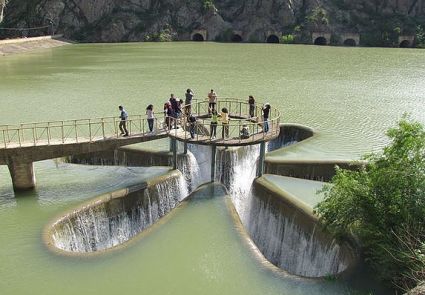


ArmInfo. The Armenian government tends to abandon the construction of large reservoirs in favor of erecting water basins with less water. Minister of Energy Infrastructures and Natural Resources of Armenia Ashot Manukyan stated this at a press conference in Yerevan on October 20.
According to him, the construction of reservoirs with a smaller volume of water will increase the efficiency of water resources management in the country. The minister recalled that last year the construction of the Vedi reservoir with a total capacity of 29 million cubic meters water was started, with the KfW bank negotiations on attracting credit resources for the implementation of the program to improve the efficiency of the Akhuryan river basin are being completed, which involves the construction of the Kaps reservoir with a total volume of 25 million cubic meters and the strengthening of the dam on the Arpa River. Earlier, the construction of the Yeghvard water reservoir with a capacity of 90 million cubic meters was also planned, but the government decided to refrain from implementing the project for the same reason, refusing to build large reservoirs. This, according to the minister, will provide an opportunity to rationally use the terrain, which will lead to economic efficiency. In particular, small reservoirs will allow creating local water distribution networks. Today, the issue of reducing the capacity of the Kaps reservoir is being considered instead of 25 million to 15 million cubic meters of water.
In March 2017, the construction of the Vedi reservoir started, which will be completed by mid-2020. Initially, the total capacity of the reservoir was planned at 29 million cubic meters and a water surface of 120 hectares, but as a result of the work the republic will receive a reservoir with a water volume of 2.5 million cubic meters more. The sources of water will be the rivers of the Ararat region - Vedi and Khosrov. The implementation of the project will also be of great importance in restoring the balance of the ecosystem of Lake Sevan. As a result of the construction of the Vedi reservoir, the mechanical irrigation of 2,900 hectares of land irrigated by water companies Vedi and Ararat will be replaced by a gravity system, which will save about 19 million kW/h of electricity, and the area of irrigated land will increase by 300 hectares. As a result of reconstruction of the irrigation network and modernization of the system, water losses, as well as operating and protection costs, will be reduced. Currently, system losses are estimated at 40-50%. Upon completion of the program, these losses will be reduced to 15-20%. As a result, the water intake from Lake Sevan for irrigation will drop to 18 million cubic meters and the fence from the water channel Artashat - on more than 11 million cubic meters. In the process of implementing the program, as noted by Harutyunyan, 150 new jobs will be created. The program for the construction of the Vedi Reservoir, which will soon provide reliable irrigation of 7,500 hectares of land in the Ararat Valley, will cost about 90 million EUR. 75 million EUR - the loan of the French Development Agency, 15 million EUR - parallel financing from the state budget of Armenia. In addition to the implementation of this project, in 2017 it is planned to complete the design work for the restoration and completion of the construction of the Kaps Reservoir on the Akhuryan River bordering Turkey. Already in early 2018, a tender for the construction of a reservoir will be announced. For this purpose, the credit resources of the German KfW bank will be sent in the amount of 50 million EUR, provided for a period of 15 years, the grace period of which is five years. As a result of the construction of the Kaps reservoir, which was suspended in 1994, it is planned to provide an additional 5,000 hectares of irrigation. The work, according to different estimates, will last about 5 years. To date, there are about 90 different reservoirs in Armenia and in the next five years, judging by the government's plans, significant progress is being made in this area. It is planned to implement two more programs for the construction of the Yeghvard and Mastara reservoirs. Funding is mainly provided from credit resources from international donors such as the Japan International Cooperation Agency (JICA), the Eurasian Development Bank, the French Development Agency, the German KFW bank, etc. The total cost of the program, including the construction and rehabilitation of all four reservoirs, is $ 350- 400 million